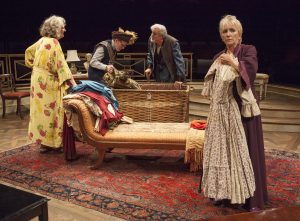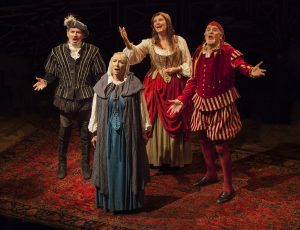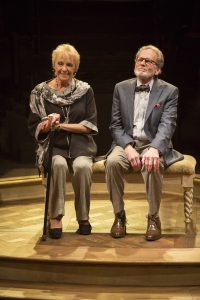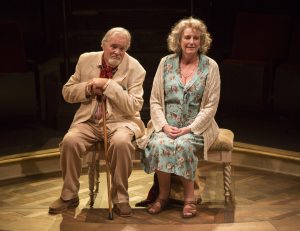Old Globe QUARTET Reaches For Past Glories
Four old opera singers, their voices long gone, are living out their days together in an English home for used-up musicians. It’s an arrangement of expediency three of them are basically charity cases but it could hardly have worked out better. Separately, their endgames would be bleak. They are keeping each other alive.
Sometimes they even acknowledge this.

Jill Tanner, Robert Foxworth, Roger Forbes and Elizabeth Franz, left to right, in the Old Globe Theatre’s Quartet. Jim Cox Photo
Ronald Harwood’s play Quartet, now on the Old Globe Theatre’s White Stage, is a sentimental, whimsical, minty shrug of acquiescence to the inevitable, flavored with some gallantry, many sighs and an ultimate stubborn style.
Growing old is no picnic, as many of us know for sure, but these four do go on about it to excess. They’re not so poorly off. Though two use canes, all of them are walking. They bolt at the dinner bell like schoolchildren. They carry on generally lucid conversations, frequently about sex. They get the occasional royalty check. And their long-ago recording of the quartet from Rigoletto has just been re-released. Even though their pictures are not on the cover, their names are. Such is the regal nature of their reputations, in fact, that they are allowed undisturbed hang-out privileges in the institution’s music room. And when their soprano shows up, completing the quartet, they are asked reverently by their fellow guests to sing together once more, for the annual gala in October honoring Verdi, the composer of Rigoletto.
Obviously, this performance will be at best a mere whisper of what they once were. But Jean, the soprano, adamantly refuses to be any part of the program.
This Jean is meant to be the true diva of the group, a once top-drawer international star who retired in her prime and has lived in glamorous seclusion since. Among her several husbands was, briefly, her new fellow guest, the tenor Reggie.
Their mezzo-soprano, Sissy, is a vague darling given to coddling everyone but herself. And the baritone, Wilfred, prefers to present himself as an old rogue ready for mischief.
Reggie is prissy, Wilfred blusters tediously and Sissy wades in treacle. They affect impatience, cultivate eccentricities and indulge in self-pity. But Jean is the champion of the latter. She expects not only preferential treatment but also an acknowledgement of the world’s savage ironies which have brought her to such a tragic end.
In short, they behave like a bunch of retired opera soloists.
It’s too bad, everybody agrees, that Jean won’t play along. Everybody at the home is pumped with anticipation, even the old rivals anxious to establish a new pecking order. And somebody has even dug up a trunkful of Rigoletto costumes from the old Carl Rosa Opera Company (1873-1960).
But, says Jean, finally abandoning her airs, she really can’t sing any longer. She hasn’t been able to for decades. That’s one of her dark secrets. Her colleagues, stunned, began to ponder trio repertoire until… Listening to their recording, they all have the same idea at about the same moment: A way to wear the costumes, receive the applause and preserve the dignity while saluting what they were.
From there until the night of the concert, there’s plenty of time for everybody to wax and wane, to waver and then be strong, to yearn, to grieve and especially to confess. Endlessly. Ultimately, the confessions come so rapidly and regularly – “I was unfaithful…”, “I never achieved satisfaction…” etc. – that they mostly fall unnoticed.
And, after that final curtain call, what’s left to say?
The four-member Globe cast approach a couple of centuries of combined experience not only in playing but also in being characters, so director Richard Seer wisely gives them whatever room they need, steering only, when needed, for coordination’s sake. Ralph Funicello’s set is a trite, musty, worn, comfortable cuccoon; Charlotte Devaux finds a through-line of faded flambouyance for the costumes; and York Kennedy’s lighting requirements are minimal but deft.
Elizabeth Franz has the most arduous assignment – making Jean palatable – and she’s not entirely successful. There is plenty to pity but little that sparks the star quality attributed to the character, more a hopeless surrender. As Reggie, Robert Foxworth fights back doggedly. He’s the one writing the autobiography, he’s the one who wants to rehearse and he’s the one who will secure marmalade for breakfast. And Foxworth is the one who best plasters over the author’s inconsistancies.

Robert Foxworth, Elizabeth Franz, Jill Taner and Roger Forbes in finale of Quartet at the Old Globe. Jim Cox Photos
There is no sweepstake winner of the Unforgettable Cup here, but if there were, Jill Tanner would be a contender. Her character offers more range and more comfort than the others and she exploits this luxuriously. Roger Forbes, on the other hand, sinks so comfortably into the stereotypes of the gruff old bear that his revelations inspire fondness rather that surprise.
Together, they honor the music, the author, the management and themselves.
[box] Continues at 7 p.m. Tuesdays, Wednesdays and Sundays; at 8 p.m. Thursdays-Saturdays; and at 2 P.m. Saturdays and Sundays through Aug. 24, 2014.[/box]

Welton Jones has been following entertainment and the arts around for years, writing about them. Thirty-five of those years were spent at the UNION-TRIBUNE, the last decade was with SANDIEGO.COM.




